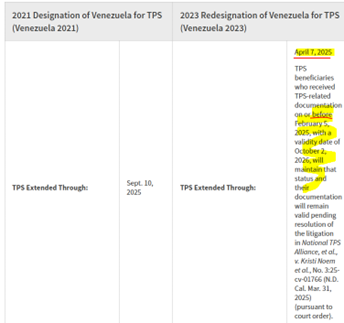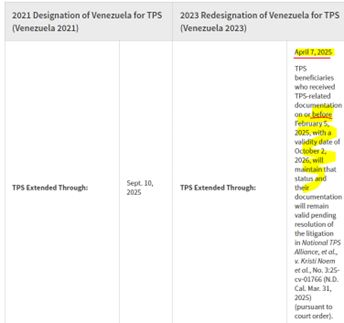- within Immigration topic(s)
- in European Union
- within Immigration topic(s)
- in European Union
- in European Union
- in European Union
- in European Union
- in European Union
- in European Union
- in European Union
- with readers working within the Aerospace & Defence, Banking & Credit and Basic Industries industries
- within Immigration, Compliance and Consumer Protection topic(s)
Late Friday evening, June 6, 2025 – right after we posted TPS Twist: Court Halts DHS Action on Certain Venezuelan Work Authorization-For Now – U.S. Citizenship and Immigration Services (USCIS) updated its website with a significant clarification regarding the status of individuals who received Temporary Protected Status (TPS) under Venezuela's 2023 redesignation. If you blinked, you may have missed the update.


The update confirms what we had previously reported: The 2023
TPS designation for Venezuela was officially terminated on April 7,
2025, and work authorization under this designation ended on April
2, 2025. However, in a twist that echoes recent litigation, USCIS
acknowledged that a narrow group of individuals who received
Venezuela TPS-related documentation on or before February 5, 2025,
with an expiration date of October 2, 2026, will retain their
status and documentation—at least for now.
This clarification follows a series of legal developments,
including a district court ruling in National TPS Alliance v.
Noem and a subsequent emergency stay issued by the U.S.
Supreme Court on May 19, 2025. The litigation is ongoing, and the
final outcome remains uncertain.
What Does This Mean for Venezuelan TPS Holders?
- The 2023 Venezuela TPS redesignation, announced on October 3, 2023, has been terminated by DHS Secretary Kristi Noem.
- The Supreme Court's stay means that Venezuela TPS-related documents issued after February 5, 2025, under the 2023 designation are no longer valid.
- However, individuals who received valid documentation on or before February 5, 2025, with an expiration date of October 2, 2026, may continue to rely on those documents while the case proceeds.
TPS Under the 2021 Venezuela Designation Remains in Effect
- TPS for Venezuela recipients under the 2021 designation remains valid through September 10, 2025.
- This earlier designation is not affected by the current litigation or the Supreme Court's stay.
What Employers and TPS Holders Need to Know
Employers should carefully verify the issuance date of their employees' TPS-related documents. If issued on or before February 5, 2025 with an October 2, 2026 expiration date, they remain valid for Form I-9 purposes during the litigation.
Employment Authorization Documents (EADs) with the following expiration dates are no longer valid for employment:
- September 9, 2022
- March 10, 2024
- April 2, 2025
- February 2, 2026
- October 2, 2026 (unless issued on or before February 5, 2025)
TPS holders under the 2021 designation should ensure their documentation is current and valid.
What Should Employers Do?
Employers should carefully review the work authorization of employees who are Venezuelan TPS recipients. If document copies are retained, employers should check the expiration dates on the employees' EADs. If document copies are not available, employers should refer to the most recent expiration date listed on the employees' Forms I-9. In some cases, these EADs will not be associated with TPS, meaning they will not bear the category codes A12 or C19. In these instances, employers may want to consider adding a note to the Additional Information Box noting the reverification meeting and a confirmation that an employee's EAD is unrelated to TPS.
Employees whose EADs reflect A12 or C19 with any of the now-invalid TPS Venezuela expiration dates must present alternative documentation to continue working. Acceptable alternatives may include an EAD with a C08 category code or other List A or List C document listed in USCIS's Lists of Acceptable Documents.
If an employee is unable to provide valid alternative work authorization, the employer may no longer lawfully continue their employment.
We understand how confusing and burdensome this situation is for employers—particularly those who hired employees with valid work authorization in good faith, only to now face the complex task of reassessing documentation, navigating ambiguous guidance, and carrying out the difficult process of terminating employment. These challenges are further compounded by the ongoing wind-downs of other TPS programs, as well as the termination of CHNV Humanitarian Program parole—a program whose recent end is arguably even more confusing for employers because of the lack of clear guidance on how to identify affected employees. The immigration landscape continues to shift rapidly, and we remain committed to monitoring these developments and providing clear, timely guidance to help both employers and employees stay informed and compliant.
The content of this article is intended to provide a general guide to the subject matter. Specialist advice should be sought about your specific circumstances.



